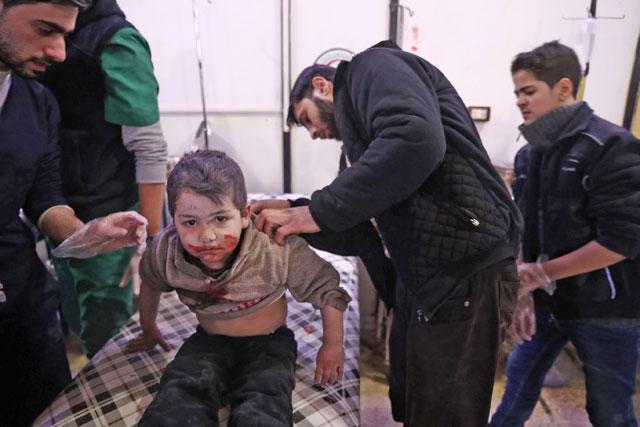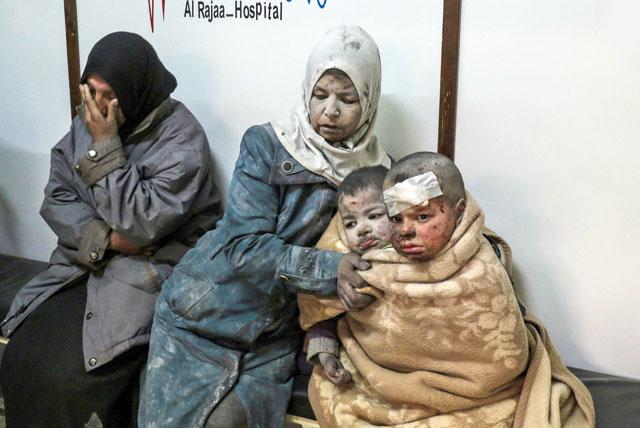You are here
Syria regime shelling ‘bloody message’ before talks — opposition
By AFP - Feb 19,2017 - Last updated at Feb 19,2017

A wounded Syrian boy receives treatment at a make-shift hospital following a reported government air strike on the rebel-held town of Douma, on the eastern outskirts of the capital Damascus, on Sunday (AFP photo)
BEIRUT — The leading Syrian opposition body on Sunday lambasted escalating attacks by government forces as a "bloody message" aimed at sabotaging peace talks that are due to open in Geneva next week.
The High Negotiations Committee (HNC) said recent attacks near Damascus, Homs city, and elsewhere were "obstructing the efforts aimed at a political transition in Syria".
"It is a bloody message from a criminal regime just a few days ahead of political negotiations in Geneva that demonstrates its rejection of any political solution," the HNC said in an online statement.
Armed opposition groups went even further, accusing the regime of eliminating any shot at a peaceful resolution to Syria's war.
In a statement released Sunday, rebels said the shelling around Damascus, Homs, and northwest Idlib "undermines the ceasefire and finishes off opportunities for a political solution".
At least 16 people were killed on Saturday when government forces shelled a funeral near Damascus, and three civilians were killed in air strikes on the last rebel-held district of Homs city, according to the Syrian Observatory for Human Rights.
And on Sunday, seven civilians were killed in air strikes on a town in southern Syria, while an exchange of shelling in Daraa city killed a nurse and a young girl, the monitor said.
Peace talks in Geneva are set to begin on February 23, featuring a new chief opposition negotiator on behalf of the HNC, lawyer Mohammed Sabra.
Formed in December 2015, the HNC has risen to prominence as the leading umbrella group for Syrian opposition factions.
Sabra will replace Mohamed Alloush of the Army of Islam rebel group, which said it would participate in the delegation in an advisory capacity.
Alloush has twice headed the rebel delegation to talks in Kazakhstan, where opposition backer Turkey and regime allies Russia and Iran organised parallel negotiations.
Meetings in Astana have focused on confidence-building measures and reinforcing a frail, seven-week truce deal also brokered by Ankara and Moscow.
By comparison, negotiations in Geneva are expected to address the key issues that divide the two sides, including the fate of President Bashar Assad.
His role in Syria’s future remains the primary sticking point, with the opposition insisting that he leave at the beginning of any transition period.
Related Articles
BEIRUT — Syrian government forces on Monday escalated their bombing campaign around Damascus, raining shells down on rebel territory and sen
BEIRUT — Syria's opposition on Sunday announced its 21-member delegation, including 10 rebel representatives, for a new round of UN-sponsore
BEIRUT — Aid groups launched their largest aid delivery yet in war-torn Syria on Thursday after the UN evacuated hundreds of besieged reside

















